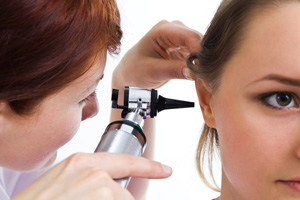Blocked Ear
 All About a Blocked Ear
All About a Blocked Ear
Have you ever had a blocked ear? Did it aggravate you? Did the fact that you did not know what caused it or what to do about it frustrate you? If so, then you are in good company. Most people have had this condition at one point or the other throughout their lives, and if you have not had it yet, you probably will. While blockage in your ear is not necessarily dangerous, it could be indicative of a more serious condition; as such, you should treat it as soon as it arises. This article will tell you about ear blockages and how you can treat them and rid yourself of that bothersome affliction.
A blocked ear is typically indicated by a reduction of hearing in one or both ears. It also is accompanied by symptoms of discomfort and even pain if severe. Other symptoms that frequently arise with this condition include stuffy sinuses, mild headaches, and maybe a slight fever. Note, though, that blockage in the ear does not cause these symptoms; they merely tend to come up with this condition as a result of whatever is causing the blockage in the first place.
You can get a blocked ear from a variety of causes. The most common is due to swimming or water immersion, otherwise commonly known as “swimmer’s ear”. This occurs when water seeps into your inner ear canal and remains lodged there, making it uncomfortable to you and also reducing your hearing somewhat. It can be annoying, but it is generally not considered dangerous. Small children are particularly susceptible to this cause. To cure this, simply purchase swimmer’s ear solution at your local pharmacy or supermarket and apply as needed. It should disappear on its own shortly. Similarly, too much earwax in the ear canal can cause this condition. Again, it is not generally serious, although you should take care to clean your ears regularly.
There are more serious causes of a blocked ear than water immersion or ear wax, however. One type comes when the inner ear canal becomes inflamed through illness. This is called “acute otitis externa”, and can be painful. Typically the illness responsible for this type of inflammation is a bacterial infection that can be treated with antibiotics. You will know you have this type if your ear is red and swollen or tender to the touch in addition to being blocked. Also, a fever will commonly accompany your symptoms.
Another related cause is Eustachian tube inflammation. This generally happens when you have a cold. The Eustachian tubes in your ear will become either inflamed or blocked with fluid, resulting in discomfort, pain, and even a possible loss of balance or disorientation. The symptoms are similar to those listed above; if you have a head cold and your ears become blocked, this is most likely the cause. Eustachian tube inflammations can result due to a variety of causes, and may be indicative of something that requires medical attention.
To treat all kinds of ear blockages, you should consult a doctor. If it is just swimmer’s ear, then it will go away on its own. If it does not, or if the pain is more severe and persisting, then see a physician. They can either remove the object (if it is ear wax or some other kind of object causing the blockages) or can irrigate your ear with liquids designed to clear the inner ear canal and restore clear pathways for your hearing. To help prevent this, clean your ears regularly, wear earplugs while swimming, wash your hands after every meal and using the restroom, and generally try to take care of your health. If you do, you will soon notice that your blocked ear symptoms will disappear.